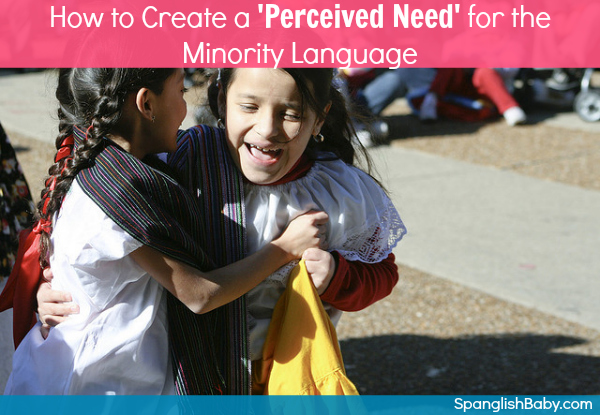While I was registering to get the H1N1 vaccine this weekend at the local high school, the lady who was taking in the forms very politely asked if I’d rather get the information in Spanish. (I guess she’d overheard us while we were making the line.) I, also very politely, answered that it didn’t matter because I was bilingual. I don’t know if, at first, she didn’t understand me because she asked the question again. So, I repeated that eitherRead More ...
What Does it Mean to Be Bilingual?
5 Ways to Enrich Your Child’s Bilingual Vocabulary
More than one study has proven that the best way for children to develop their language and reading skills is through dialogue. This is particularly important for bilingual children. It is a fallacy to think that just sitting your child in front of the television set to watch a program in Spanish or to let them mouse around with a bilingual computer game will expose them to the kind of vocabulary needed to become proficient in the minority language. SoRead More ...
Dual Language Immersion Programs
This post was originally published on March 26, 2009. Although I believe I already was a supporter of dual language immersion programs prior to the extensive research I’ve done to put together this education series, now that I’ve learned more of its intricacies I can definitely say I have become one of its fervent advocates. Allow me to tell you why. A well-designed dual immersion program encompasses the “best of both worlds,” as I was told repeatedly by the educatorsRead More ...
Bilingual Education: A Definition
Photo by Gaetan Lee Back in March, we published a series of entries related to the complex subject of bilingual education. Ana Lilian and I spent a bunch of time researching this topic: interviewing some of those involved in this area of education–including parents and teachers–and even visiting a few schools which offer this option to their communities. Since they were pretty popular with our readers, this week we’ve decided to re-post them in case you might have missed themRead More ...
What is a Latino?
I‘ve been racking my brain the last few days trying to come up with a definition of what’s a Latino. And, for the life of me, I still don’t have an answer. I mean, I guess I could look it up in the dictionary, but the word evokes so many different attributes that the truth is there just can not be a sole interpretation. Plus, I’ve found that it really depends on who you ask. Although it’s no longer newsRead More ...
How to Create a ‘Perceived Need’ for the Minority Language
My 18-year-old goddaughter, Veronika, was recently in town for the weekend and I noticed something pretty interesting that I’m still trying to figure out. Although she was raised bilingual by my (Peruvian) sister and her father, who is Cuban, (but moved to New York as a toddler and thus speaks more English than Spanish,) ever since I can remember, we have always communicated in English. I mean, I know she understands Spanish, but when I talk to her, she hasRead More ...
A Brief Look at Heritage Language Schools
Back-to-school has been a major theme in our country this week. Today we want to explore another educational option that’s available for our niños: Heritage Language Schools. You might not have even heard of them, like us, or have no idea how to find one in your area. So, we’ve prepared this to introduce you to the basic concept of Heritage Language Schools, why they’re an excellent alternative for parents raising bilingual children and how you can get motivated toRead More ...
5 Common Myths About Raising Bilingual Children
This post was originally published on Feb. 3rd, 2009 under the title Away with the Myths. In most parts of the world, being bilingual is seen as an advantage. Back in Peru, my maternal grandfather sent my mother and her sisters to a bilingual (English/Spanish) school from kindergarten on. My parents sent both my sister and I to that same bilingual school. I hope to do the same for my daughter – send her to a bilingual school, that is.Read More ...











